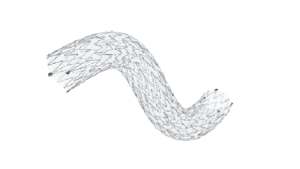
InspireMD has released the results of a meta-analysis of four clinical studies involving dual-layered and mesh-covered stents, including the company’s MicroNet-covered stent, the CGuard embolic prevention system.
The analysis concluded that carotid artery disease patients treated with mesh-covered stents experienced a 30-day minor stroke rate of 1.25%, lower than the 30-day minor stroke rates reported in other widely cited studies, such as CREST and ACT 1, for patients treated with both carotid endarterectomy and with those treated with conventional carotid stents. CREST and ACT 1 also involved lower-risk patient populations as compared to the four studies included in the meta-analysis, which included a higher percentage of high-risk and elderly patients, according to the company. The analysis was published in JACC: Cardiovascular Interventions.
Researchers examined the results of four studies that evaluated the incidence of stroke following treatment with CGuard or RoadSaver (manufactured by Terumo) stents in 556 patients. Shortly after successful procedures, six patients suffered minor strokes. During the 30-day follow-up period, one person died from myocardial infarction and one additional minor stroke. The cumulative 30-day mortality rate was 0.17%, and the incidence of stroke at 30 days was 1.25%, according to the analysis.
“This meta-analysis suggests that dual-layered stents can be safely used for (carotid artery stenting), and their use minimises the incremental risk related to symptomatic status and other risk factors,” the researchers concluded.
“The compelling results of this independent and comprehensive meta-analysis, which includes four studies of high-risk patients treated for carotid artery disease, add to the growing body of evidence that points to superior clinical outcomes with next-generation mesh-covered or dual layered devices versus their conventional carotid stent counterparts,” said InspireMD CEO James Barry. “As we continue to expand the commercial availability of our MicroNet-covered product, CGuard EPS, including the submission of a US IDE (Investigation Device Exemption) expected in mid-2019, we welcome additional analyses such as these that further support the positive findings from our own studies with MicroNet-covered products.”
“I think we are seeing a new milestone with these mesh-covered stents in that we can achieve a very acceptable, low rate of complications and stroke even in high-risk patients,” said interventional cardiologist Harald Mudra, Städtisches Klinikum, Munich, Germany. “If confirmed in larger and longer trials, these stents could open up a new population for carotid stenting who have previously been thought of as being too high-risk for the procedure.”
The extra layer of mesh keeps the small particles of plaque that can be released during the stenting process from entering the circulation, according to Mudra.










